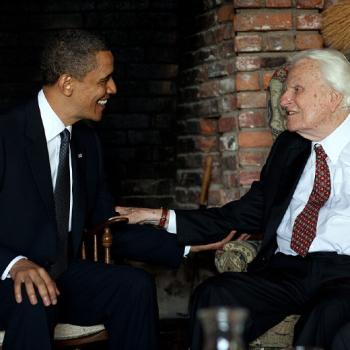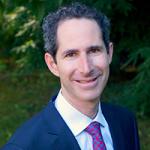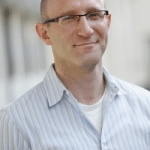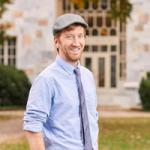The Bible proclaims: “There shall be one law for the citizen and for the stranger that dwells among you.” (Exodus 12:49) Moreover, the Bible commands, no less than 36 times, “Love the stranger.”
Many are the strangers who wish to make this great nation their home!
And yet America remains divided. There are those who wish to open our country’s borders to immigration. On the other side, there are those who wish to secure our borders, afraid that Muslim immigrants in particular will bring terrorist attacks.
In case there is any doubt, I stand with those who wish to open our doors. I stand against President Trump’s recent Executive Order banning immigration from seven Muslim countries for four months and in the case of Syrian refugees, indefinitely. In this great country of ours we are not meant to discriminate. And so on Saturday afternoon, I joined the protesters at JFK airport to raise my voice in support of my Muslim brothers and sisters. (You can read more about my experience.)
My stance should come as no surprise to those who have heard my sermons and read my writings. I remain deeply committed to the ideal that America is first and foremost a nation of immigrants. My family was welcomed here. I in turn must welcome others. I also believe that we have a moral obligation to welcome those, although certainly not all, who are seeking refuge from persecution and war. My family fled Czarist Russia. Others of my people fled a Holocaust scarred Europe. Some, the antisemitism of Arab nations. Others, the collapsing Soviet Union.
Today millions flee war-ravaged Syria. They are of course not my people. And yet I find a kinship in their flight.
[T]he most conspicuous characteristic of [refugees] is that they love life, and that they are prepared to endure unimaginable hardship, so as to preserve life, their lives and the lives of their loved ones, and the lives of their traditions and their communities. Nobody imperils their children in dangerous sea voyages, and treks across mountains unless they believe they are rescuing their children from an even greater danger that certainly awaits them.
I do not wish to abandon my fellow refugees.
For years we have remained indifferent to their plight. President Obama turned aside. He made pronouncements but did not offer assistance. His was the awesome power to do something to halt the devastation and destruction, to do anything to limit the suffering and death. Syria is now a decimated shell. Obama chose to do nothing. We became mere witnesses to Assad’s barrel bombs and ISIS’s ruthless murders. He offered eloquence but little action. He shed tears; he bowed his head, and allowed but a trickle of refugees to our shores.
Wieseltier continues:
I also learned that refugees are people who have felt abandoned by the world. It is a terrible, terrible feeling I can report, as the son of people who felt abandoned by the world. And all the rescue efforts, and all the resettlement efforts that will be made, and God knows, there are very, very few for us to boast about, will not erase, ever, that feeling that at some point the world abandoned them.
Under Obama’s watch nearly 500,000 were killed. During his presidency some 5 million became refugees. (And I am only speaking about Syria.) Let history be unforgiving in its judgment of President Obama and his failure to stand against this atrocity! These horrors are not President Trump’s doing. And yet they have now become his responsibility.
We must not remain indifferent.
Turning aside is unforgivable. Barricading our doors is cruel. The tearful, and even eloquent, indifference of Obama has given way to the cruel, and too often boastful, indifference of Trump.
To slam the door shut is to close the door to hope.
And that is a most cruel thing. America-first darkens the world’s hope. There are 5 million people who are watching their country burn from makeshift camps. They must look elsewhere for inspiration. There, they might gain fortitude. There is only one thing that can sustain them through the hunger, cold of winter, immeasurable suffering and unimaginable loss. That is hope. They can hope that there is something better, off in the distance—and if not for themselves, then at least for their children. Barricading our gates extinguishes this hope.
I worry, although the effect for the forsaken refugee remains the same, how the closing of our doors affects who we are. Our present coarseness threatens to erode our souls.
That is why I protested. I protested not because I think President Trump is doing a worse job saving these huddled masses and wretched refuse, but instead because if nothing else I wish to protect that glimmering, hopeful ideal of America. Our president’s vision threatens to obscure who we are meant to be. He closes the door to who we are.
I protested to save us, to safeguard that vision of us, that shimmering vision of hope that propelled my grandparents to these shores. America, the goldene medina! America, the golden land.
Elie Wiesel tells this story:
One day a rabbi came to the sinful city of Sodom; he knew what Sodom was, so he came to save it from sin, and from destruction. He preached to the people. “Please do not be murderers; do not be thieves. Do not be silent and do not be indifferent.” He went on preaching day after day, maybe even picketing. But no one listened. He was not discouraged. He went on preaching for years. Finally someone asked him, “Rabbi, why do you do that? Don’t you see it is no use?” He said, “I know it is of no use, but I must. And I will tell you why. In the beginning I thought I had to protest and to shout in order to change them. I have given up this hope. Now I know I must picket and scream and shout so that they should not change me.”
I wish to open our doors if for no other reason than to safeguard who we are. Or at the very least, to protect who I wish to be.















